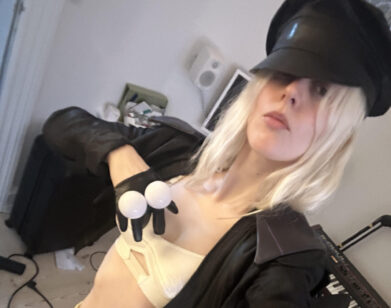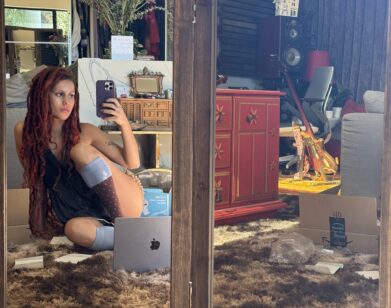Thundercat’s Touching Bass

ABOVE: STEPHEN BRUNER, AKA THUNDERCAT. IMAGE COURTESY OF B+
From an early career six-stringing for R&B’s big guns to digging a soulful hole in the music sphere of his own, Stephen Bruner, better known as Thundercat, has come a long way in a few short years. The West Coast-born bassist was raised on a rich musical diet: his father, Ronald Bruner Sr., is a drummer who has laid down beats for the likes of The Temptations and Diana Ross. After a stint playing for West Coast hardcore crew Suicidal Tendencies, Bruner went on to record and tour with a long list of acts ranging from Erykah Badu to Sa-Ra, Snoop Dogg, and Leon Ware.
The younger Bruner’s creative upbringing afforded him a deeper musical understanding than band playing could satisfy. Skip forward to 2010 and he has morphed into Thundercat, a groundbreaking solo artist in his own right who weaves soulful melodies and funky beats around his virtuosic bass playing. It’s a feat that saw his debut 2011 album, The Golden Age of Apocalypse, juice gallons of spaced out references that have cemented his music its own “cosmic-soul” tag. The follow-up, Apocalypse, drops today. Co-written and co-produced by Flying Lotus and Mono/Poly, it rides confidently on Bruner’s vocals in an emotionally charged journey spanning the melancholy to the party-starting with effortless groove. Home from his latest tour, Thundercat spoke to Interview about Drake, comics, and his journey to now.

TEMPE NAKISKA: What has it been like going from being a hired bassist for so many big acts to becoming a solo artist in your own right?
THUNDERCAT: It’s been very fun. I still don’t know what to expect from day to day. My first reaction to playing at Coachella was like a kid who has no idea of the rules. I just wanted to go have a jam session with my friends. I didn’t get that we couldn’t just jump on one another’s stages while they were performing!
NAKISKA: Why do you think you’ve developed this ability to write in a way that weaves your music so strongly around your bass playing?
THUNDERCAT: It’s like X-Men. You learn to adapt and evolve to your best skills. When I was younger, I was always a musician that could play by ear better than I could analytically. As time progressed, my songwriting developed out of my bass, because that’s all I could do. I decided to take it as far as it could go and to use my skill as a tool. You don’t have to just hit nails with hammers, you know; you can use a hammer to beat somebody’s brains in, to make armor or break a car window. You can do all kinds of things with your instrument outside of its surface purpose. My bass is my crutch but the best crutch I could have.
NAKISKA: Do you remember the first time you played bass?
THUNDERCAT: [laughs] Hell no! I remember swallowing my tooth up in a high chair, but I definitely don’t remember the first time I played bass. It was like, back there!
NAKISKA: How did your upbringing impact on you as a musician?
THUNDERCAT: Growing up in a family of artists is something I still appreciate to this day. Like today, my dad came over to my apartment to play me his album. He’s just in his own zone. I was pretty spoiled growing up, creatively and artistically; we were exposed to a lot of different things. I remember watching my brother’s friends struggle to get to the level he was at musically and wondering why they were having such a hard time. One of his friends was like, “Man, we weren’t all raised like you guys.”
NAKISKA: Let’s talk about the album. Why did you lean more towards vocals this time around?
THUNDERCAT: Lotus has this ability to lead you to something when you’re writing. He won’t necessarily say anything, but he will just let it happen. He wanted to hear me sing more on this album, so it happened.
NAKISKA: Is that one of the reasons you and Flying Lotus work so well together?
THUNDERCAT: We share a very close space mentally. That’s the main thing: we often see things that the other person may not see. He suggested I sing more, and I was like, “All right!” I didn’t think much of it at the time but it ended up shaping the album. I remember being so nervous singing on the first album. Not everybody can be Alexander O’Neal, you know?
NAKISKA: Who else would you like to collaborate with?
THUNDERCAT: Drake. Lil’ B, and who else? [pauses] Oh, Allan Holdsworth. But Drake mainly, his stuff is amazing. He’s such an emotional cat, and it’s pretty dope the way all these different elements make up his character creatively, he doesn’t have to think too much about what it is he’s doing because it comes naturally to him. Drake sings great, he raps great, I’m pretty sure he plays tennis great and ties his shoes the best. Basically I just wanna be like Drake.
NAKISKA: You really seem to love working with other artists, why?
THUNDERCAT: It comes from a genuine want to connect with others. It comes from a place of exploration, wanting to go into the unknown. It comes from the spontaneity of the moment. I like the grey areas, when you don’t really know what’s going on and when the music is going somewhere as opposed to having been there already. Growing up playing jazz and improvising has had a big impact on me, and it translates into my music.
NAKISKA: Do you think artists like you are pushing hip-hop towards becoming the new jazz?
THUNDERCAT: That would be cool! Imagine if you saw Waka Flocka singing “‘Round Midnight” with his finger in his ear. [laughs] But yeah, I hope what we’re doing can free people up a little more in the context of our music.
NAKISKA: And that’s really what I take from your music, this total sense of enjoyment and freedom within the groove.
THUNDERCAT: Yeah, we had a lot of fun writing the album. Like me and Mono/Poly working together, our relationship is hilarious. We don’t even say hi to one another most of the time. If he’s having a good day I want to say something that will ruin it. If he’s having a bad day, I want to make it better.
APOCALYPSE IS OUT TODAY VIA BRAINFEEDER. FOR MORE ON THE ARTIST, VISIT THE BRAINFEEDER WEBSITE OR CHECK OUT HIS TUMBLR.






